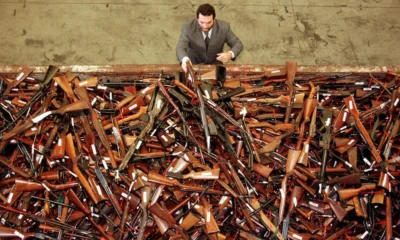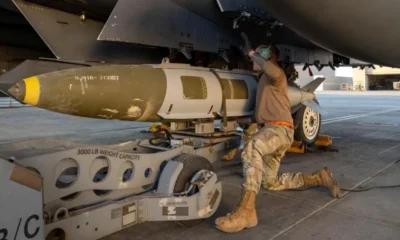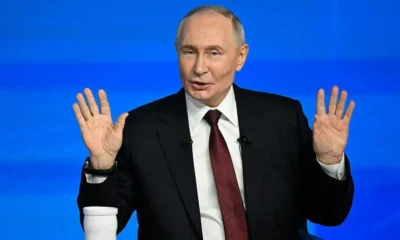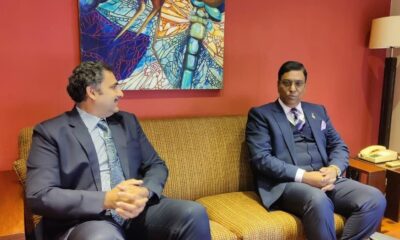Pakistan News
Peace with dignity

AS escalation appeared on the cards with tit-for-tat missile and air attacks continuing between India and Pakistan, US President Donald Trump announced on his Truth Social media platform that a US-mediated “full and immediate” ceasefire had been agreed between the two nuclear-armed South Asian neighbours.
In the hours, even minutes before the Trump announcement, fears were mounting of a major escalation with India’s missile attacks against non-military targets followed by strikes against military bases in Pakistan and the latter’s retaliatory action targeting Indian military assets.
At that point, when the situation seemed poised on a knife-edge, the only certainty was that India’s attempt to set a new normal in carrying out attacks deep inside Pakistan after blaming the latter for its own security and intelligence and policy failures in held Kashmir had backfired spectacularly.
Whether among the five downed Indian warplanes, during the aerial fight with BVR (beyond visual range) weapons, after the first set of missile attacks on Pakistan earlier this week, were two French-made Rafale jets or three is immaterial.
As South Asia heaved a sigh of relief that a nuclear exchange had been averted, what next was the question on many minds.
What counts is that purchased at way over $250 million apiece, the state-of-the-art warplane, the perceived force multiplier, failed to project power as it was meant to and was effectively neutralised by weapons systems used by the Pakistan Air Force with stunning skill. The PAF’s most expensive J-10C fighter costs a fifth of the Rafale’s price tag.
PAF’s multiple kills seemed to have taken defence and modern aerial warfare experts by surprise. A cursory glance at the world media in general, and defence-related publications/ sites in particular, shows the fascination with how the Chinese-provided assets were used to lethal effect by the PAF.
It was this embarrassment that perhaps made immediate de-escalation difficult as India continued to talk of de-escalation while targeting Pakistani bases in the small hours of Saturday, provoking retaliation from Pakistan, which claimed huge successes in its missile/ air campaign including hitting the formidable Russian-made S-400 air defence missile site on an Indian Air Force base.
https://www.dawn.com/news/card/1909714
At a media briefing in New Delhi, the Indian military spokeswomen conceded ‘limited damage’ at three of their bases, while again reiterating they wanted to ‘de-escalate’. More or less as this briefing was happening another high-explosive drone strike on a PAF base in Sindh, near Hyderabad, was confirmed. Casualties, including fatalities, were feared.
This prompted concerns that Pakistan would also be compelled to retaliate in a spiralling confrontation. In such a rapidly escalating military conflict, miscalculations can happen, leading to untold repercussions, given the two nations are said to together possess some 300 tactical and strategic nuclear warheads and also tested, diverse delivery systems.
As South Asia and possibly the wider world heaved a sigh of relief that a possible, even if improbable, nuclear exchange had been averted, what next was the question on many minds. Would it be back to the future, a repeat of the past so many decades when a terrorist incident in India blamed on Pakistan would lead to fears of war with troops locked in eyeball to eyeball stand-offs as they have many times, before de-escalation?
Many Pakistanis and, I am sure, Indians, may have become accustomed to such recurrences every few years. But after the last round of tension triggered by the Pulwama attack in Indian-held Kashmir that left dozens of paramilitary soldiers dead in 2019 was the first instance of a ‘retaliatory’ strike on Pakistan soil and the downing of an IAF fighter and the capture of their pilot, as the PAF responded.
But attacking a forested area in Balakot, adjacent to Azad Kashmir where hostilities routinely erupt, and claiming a win was one thing, launching missile attacks on civilian targets deep inside Pakistan this week after last month’s Pahalgam terror attack was a different matter.
Pakistan, it turned out, was determined to robustly resist this attempt by India to set a new normal. The embarrassment of losing state-of-the-art aerial assets drove India to launch missile attacks on PAF bases. And the Pakistanis who appeared prepared and determined to hit back, did so, as per their claims, with telling effect and forced India to agree to a ceasefire.
Now many readers in India would consider the use of the word ‘forced’ unacceptable, given what they have been hearing in their government-controlled and dominated media and sanitised social media environment but they would do well to reflect what their government stance on talking to Pakistan has been.
After President Trump announced the ceasefire and congratulated both countries on displaying “common sense and great intelligence”, the more revealing and tell-tale tweet came from Secretary of State Marco Rubio who said Vice President J. D. Vance and he had engaged with senior Indian and Pakistani officials including the two prime ministers, the Indian foreign minister, the two national security advisers and the Pakistan army chief.
He commended the two prime ministers on their “wisdom, prudence and statesmanship in choosing the path of peace”. But the most significant part of his statement was that both the countries had agreed to “start talks on a broad set of issues at a neutral site”.
The timing or the place of these talks was not immediately known but whether these happen in Abu Dhabi, as was being speculated, or elsewhere, it wasn’t without significance that India shifted from its position of no talks with Pakistan “until the latter ends its support to terrorism”.
Like it usually happens between India and Pakistan, both will claim this as a win but it is clear that only one side moved from its stance on talks as Islamabad has repeatedly called on New Delhi to come to the negotiating table.
If a dialogue were to materialise indeed and India does not backtrack, then the real winners will be the people of the subcontinent, several hundred million of whom try and survive below the poverty line. A terrible war has hopefully been averted and perhaps the newly established balance of conventional power below the nuclear threshold will prevent future conflicts.
The writer is a former editor of Dawn.
Published in Dawn, May 11th, 2025
Pakistan News
Rubio’s Gaza Signal and Pakistan’s Strategic Crossroads

Paris (Imran Y. CHOUDHRY) :- Former Press Secretary to the President, Former Press Minister to the Embassy of Pakistan to France, Former MD, SRBC Mr. Qamar Bashir analysis : When US Secretary of State Marco Rubio publicly acknowledged Pakistan’s willingness to “consider being part” of the proposed International Stabilisation Force (ISF) for Gaza, he did more than offer diplomatic gratitude. He placed Pakistan—quietly but unmistakably—at the center of the most sensitive post-war experiment in the Middle East. Rubio’s words, carefully hedged yet pointed, signaled that Washington sees Pakistan not as a peripheral participant, but as a key pillar of a force designed to oversee Gaza’s transition from devastation to an uncertain peace.
For Islamabad, this moment marks a profound strategic crossroads. Participation in the ISF may promise international relevance, economic relief, and renewed favor in Washington. Yet it also carries the risk of deep domestic backlash, ideological rupture, and entanglement in a conflict where the lines between peacekeeping and coercion are dangerously blurred.
At the heart of the issue lies the mandate itself. President Donald Trump’s 20-point Gaza peace plan—endorsed by the UN Security Council—envisions an international force, composed largely of troops from Muslim-majority countries, stepping in after Israel’s withdrawal to oversee stabilisation, reconstruction, and security. Officially, the ISF is framed as a neutral mechanism to prevent chaos and facilitate recovery. In practice, however, its most controversial task is implicit: the disarmament of Hamas and other Palestinian resistance groups.
This is where Pakistan’s dilemma begins. Unlike Israel, which under the plan is required to vacate Gaza, or Western powers reluctant to deploy ground troops, Pakistan would enter Gaza with boots on the ground and credibility among Muslim populations. That very credibility is what makes Islamabad attractive to Washington—and simultaneously vulnerable at home. A Pakistani soldier confronting a Palestinian fighter will not be seen as a neutral peacekeeper by Pakistani public opinion; he will be seen, fairly or not, as enforcing a US-backed order against fellow Muslims.
Field Marshal Asim Munir, now the most powerful military figure Pakistan has seen in decades, stands at the center of this storm. Recently elevated to oversee all three armed services, granted an extension until 2030, and shielded by constitutional immunity, Munir possesses unparalleled authority to take strategic risks. His close personal rapport with President Trump—symbolized by an unprecedented White House lunch without civilian officials—has restored trust between Washington and Rawalpindi after years of strain.
But power does not eliminate consequences. It merely concentrates responsibility. Supporters of participation argue that Pakistan’s military is uniquely qualified for the mission. It is battle-hardened, experienced in counterinsurgency, and among the world’s largest contributors to UN peacekeeping operations. Financially, such missions bring dollar-denominated compensation, easing pressure on a struggling economy and reinforcing an institutional model the Pakistani military knows well. Diplomatically, participation could elevate Pakistan as a responsible global actor and secure US investment and security cooperation at a critical time.
Yet these gains are contingent—and fragile. The most glaring weakness in the ISF proposal is mandate ambiguity. Peacekeeping traditionally rests on consent, neutrality, and limited use of force. Disarmament does not. If Hamas and other resistance factions refuse to surrender weapons voluntarily—as they have already signaled—then enforcement becomes unavoidable. In such a scenario, Pakistani troops would not merely stand between factions; they would become a party to coercion.
Compounding this is the absence of reciprocal enforcement mechanisms. The peace plan offers no clarity on what happens if Israel fails to fully withdraw from designated areas or violates post-withdrawal commitments. There is no indication that the ISF would be empowered to confront Israeli forces. The result is a one-sided enforcement architecture: Palestinian groups disarmed under international supervision, while Israel operates beyond the ISF’s reach. For Pakistan, this asymmetry is politically toxic.
At home, the risks multiply. Pakistan’s Islamist parties—particularly groups with strong street power such as JUI factions and Jamaat-e-Islami—are deeply opposed to US and Israeli policies in Palestine. Even with bans, arrests, and crackdowns, their ideological reach remains intact. Any perception that Pakistani soldiers are killing or detaining Palestinians—even in Gaza, even under UN authorization—could ignite nationwide protests, destabilizing cities and overwhelming civil order.
The backlash would not be confined to religious parties. Large segments of the public, already alienated by domestic political engineering and military dominance, would frame ISF participation as another example of Pakistan’s security establishment acting without popular consent. The absence of parliamentary debate or a national consensus would magnify this perception. In a country where legitimacy increasingly comes from the street rather than the chamber, this is a perilous omission.
There is also a quieter but no less serious concern: morale within the ranks. Pakistani soldiers are drawn from a society that overwhelmingly sympathizes with the Palestinian cause. Asking them to enforce disarmament against Palestinian fighters—while Israeli forces face no comparable restraint—could strain discipline and cohesion. Militaries can obey orders, but they are not immune to moral dissonance.
Internationally, Pakistan faces the risk of strategic isolation if the mission falters. Gaza remains volatile, traumatized, and heavily armed. If the ISF encounters resistance, sustains casualties, or becomes mired in urban conflict, global enthusiasm may fade. Major powers can distance themselves; troops on the ground cannot. Pakistan could find itself trapped in an open-ended deployment with no clear exit strategy, absorbing blame while others retreat to diplomatic safety.
Yet opportunities do exist—if handled with exceptional care. Pakistan could leverage its importance to insist on strict limitations: a mandate centered on civilian protection, humanitarian access, and policing ceasefire lines, explicitly excluding forced disarmament. It could demand written guarantees on rules of engagement, funding, timelines, and collective Muslim participation to avoid unilateral exposure. Properly negotiated, participation could position Pakistan as a mediator rather than an enforcer.
But such outcomes require transparency, parliamentary involvement, and a willingness to say no if red lines are crossed. The fundamental question is not whether Pakistan can participate in the Gaza stabilisation force. It is whether it can afford to do so on the terms currently envisioned.
Without clarity, consensus, and balance, ISF participation risks becoming a strategic trap: modest diplomatic gains purchased at the cost of domestic instability, moral authority, and long-term security. Field Marshal Munir’s unprecedented power may allow him to make the decision—but it will not shield Pakistan from its consequences.
History offers a cautionary lesson. Nations that enter foreign conflicts under vague mandates often discover too late that stabilisation is easier to promise than to deliver. For Pakistan, Gaza is not merely a distant theater. It is a mirror reflecting the tension between power and legitimacy, ambition and restraint. How Islamabad responds will shape not only its role in the Middle East, but the fragile equilibrium at home.
In this moment, strategic prudence—not proximity to power—may prove the ultimate test of leadership.
Pakistan News
Pakistan, Mauritius Cultural Ties Strengthened Through Dialogue between High Commissioner, Mauritius, and Executive Director Alhamra

(Bilal Javaid – Bureau Chief) Lahore, December 19: The High Commissioner of the Republic of Mauritius, H.E. Munsoo Kurrimbaccus, visited the Lahore Arts Council Alhamra, Mall Road, Lahore, where he received a warm and dignified welcome. During the visit, the Honourable High Commissioner of Mauritius and Muhammad Nawaz Gondal, Executive Director, Alhamra, engaged in a comprehensive meeting focused on shared historical, cultural, literary, and artistic interests.
The discussion underscored the importance of fostering bilateral cultural relations between Pakistan and Mauritius, with a particular emphasis on collaboration in language, literature, the performing arts, and cultural exchange. Both sides acknowledged culture as a powerful bridge that connects nations beyond geography, fostering people-to-people ties and mutual understanding.

Mr. Munsoo Kurrimbaccus appreciated the richness and depth of Pakistan’s cultural and literary heritage and expressed keen interest in expanding cultural cooperation between the two countries. He praised Alhamra’s role as a leading cultural institution, describing it as an effective platform for promoting artistic dialogue and cultural diplomacy in the region.
Executive Director Alhamra Muhammad Nawaz Gondal emphasized that enhanced cultural and literary collaboration between Pakistan and Mauritius would further strengthen public relations. He reaffirmed Alhamra’s commitment to promoting international cultural engagement and shared artistic values. On the occasion, he presented a commemorative shield to the High Commissioner as a gesture of goodwill and mutual respect and paid tribute to Mauritius’s historical, cultural, and linguistic heritage.
The meeting was deemed highly constructive by both sides, with a consensus reached to explore joint cultural and literary initiatives in the future to deepen bilateral relations and foster cross-cultural appreciation.
Deputy Director Admin Syed Umair Hassan, Deputy Director of Programs Wasim Akram, and other officers were also present during the visit.
Pakistan News
When Law Wears a Uniform

Paris (Imran Y. CHOUDHRY) :- Former Press Secretary to the President, Former Press Minister to the Embassy of Pakistan to France, Former MD, SRBC Mr. Qamar Bashir analysis : A state does not collapse the moment tanks roll into the capital or a general announces the suspension of the constitution. History shows that the most enduring and damaging forms of authoritarianism often emerge quietly, through legal amendments, institutional rearrangements, and the gradual subordination of civilian authority to military command. Pakistan today stands at precisely such a juncture. Without a formal declaration of martial law, the country exhibits nearly every substantive characteristic by which political scientists, constitutional scholars, and international legal bodies define military rule. The façade of civilian governance remains, but the substance of power has decisively shifted.
At the heart of this transformation is the structural reconfiguration of the state itself. Across established democracies, civil–military relations rest on a clear and universally accepted principle: the military serves under civilian supremacy, operates within defined constitutional limits, and remains institutionally subordinate to elected authority. Whether in the United States, the United Kingdom, France, or even semi-authoritarian systems, military chiefs hold fixed tenures, retire on schedule, and answer to civilian defense ministers and legislatures. There exists no precedent in functioning constitutional governance for a serving army chief, paid from the civilian treasury, to hold office indefinitely or for life.
Yet Pakistan has moved dangerously close to precisely this anomaly. Through constitutional amendments passed under conditions widely perceived as coercive, the tenure of the army chief has been repeatedly extended, while public discourse has been deliberately conditioned to normalize permanence in a role that, by its nature, must be temporary. When asked about retirement, the response is not institutional humility but visible irritation, coupled with claims of higher national missions that render accountability irrelevant. In comparative constitutional terms, this is not stability; it is personalization of power.
Even more striking is the concentration of military command itself. In established systems, the separation of services—army, navy, and air force—is not a matter of tradition alone, but a safeguard against absolute control. Joint coordination exists, but supremacy does not. No single uniformed officer simultaneously dominates all branches without civilian oversight. Such consolidation is historically associated not with national defense, but with military autocracy. Pakistan’s recent constitutional restructuring, which elevates one office above all armed services, represents not administrative efficiency but a profound distortion of command balance, extending martial dominance even within the military itself.
This internal militarization has been matched by an external economic takeover. Across the world, armed forces may execute infrastructure projects during emergencies or provide logistical support for development, but they do not own, manage, or monopolize the national economy. Pakistan’s experience diverges sharply from this norm. Military-controlled entities now dominate infrastructure development, often without competitive bidding, while strategic sectors such as agriculture, logistics, and industrial development—particularly under the second phase of the China–Pakistan Economic Corridor—have been effectively absorbed into a corporatized military ecosystem.
International development models recognize Special Economic Zones as civilian-led instruments for industrial growth, foreign investment, and employment generation. Their capture by military institutions transforms them from engines of inclusive development into closed systems of rent extraction. This shift does not merely distort markets; it entrenches a new political economy in which economic power reinforces coercive authority, and civilian institutions are hollowed out from within.
Equally consequential is the erosion of judicial independence. A functioning judiciary is not defined by the existence of courts, but by their capacity to restrain power. Where judges operate under intimidation, where constitutional amendments are insulated from challenge, and where prolonged detentions persist without due process, the rule of law becomes performative rather than real. International legal doctrine is unequivocal: when courts can no longer check the executive or the military, constitutional order has collapsed in substance, regardless of its textual survival.
Parliament, too, has been reduced to form. Comparative legislative studies demonstrate that assemblies lose legitimacy when they cease to deliberate freely and instead function as instruments for retroactive legal cover. When amendments are passed not through consensus but under duress, law itself becomes a weapon rather than a restraint. In such conditions, elections do not restore democracy; they merely legitimize its absence.
Control over media completes the architecture of undeclared martial rule. Authoritarian systems rarely silence all voices; instead, they curate narratives, elevate loyal platforms, and delegitimize dissent by branding it treasonous. The role of the military spokesperson in Pakistan has evolved from institutional communication to overt political arbitration, publicly condemning one political force while sanctifying another. This is not information management; it is narrative command.
Taken together, these developments satisfy every internationally recognized criterion of martial law as defined in political theory and comparative governance. Civilian supremacy has been replaced by military dominance. Economic control has shifted from elected institutions to uniformed management. Judicial independence has been neutralized. Parliamentary authority has been subordinated. Media freedom has been constrained. Political opposition has been criminalized. The absence of a formal proclamation does not negate these realities; it merely disguises them.
History offers a sobering warning. States that normalize indefinite military rule do not achieve stability; they accumulate fragility. Institutions decay, merit collapses, economic confidence erodes, and society internalizes fear as a governing principle. Even the armed forces suffer, as blocked promotion pathways and personalized command undermine professionalism and morale. What begins as control ends as corrosion.
Pakistan today stands not at the edge of a constitutional crisis, but deep within one. The question is no longer whether martial law exists, but whether the nation can reclaim civilian sovereignty before irreversible damage is done. Democracies are not destroyed in a single night; they are dismantled piece by piece, until law itself wears a uniform and authority answers to no one.
And history is unambiguous on one final point: no state can endure indefinitely when the gun replaces the constitution as the final arbiter of power.
-

 Europe News10 months ago
Europe News10 months agoChaos and unproven theories surround Tates’ release from Romania
-

 American News10 months ago
American News10 months agoTrump Expels Zelensky from the White House
-

 American News10 months ago
American News10 months agoTrump expands exemptions from Canada and Mexico tariffs
-

 American News10 months ago
American News10 months agoZelensky bruised but upbeat after diplomatic whirlwind
-

 Art & Culture10 months ago
Art & Culture10 months agoThe Indian film showing the bride’s ‘humiliation’ in arranged marriage
-

 Art & Culture10 months ago
Art & Culture10 months agoInternational Agriculture Exhibition held in Paris
-

 Pakistan News6 months ago
Pakistan News6 months agoComprehensive Analysis Report-The Faranian National Conference on Maritime Affairs-By Kashif Firaz Ahmed
-

 Politics10 months ago
Politics10 months agoUS cuts send South Africa’s HIV treatment ‘off a cliff’

















